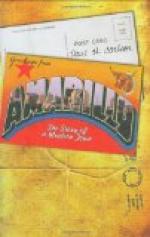“Take my advice,” said Harry, “donate nothing. Say nothing about this gift; I will take care of the warden, and I can answer for the dean.”
“Yes,” said the dean, “on the whole, Gilling, you would better say nothing, I think; Mr. Lossing is more afraid of a reputation for generosity than of the small-pox.”
The older man looked at Harry with glistening eyes of admiration; with what Christian virtues of humility he was endowing that embarrassed young man, it is painful to imagine.
The dean’s eyes twinkled above his handkerchief, which hid his mouth, as he rose to make his farewells. He shook hands, warmly. “God bless you, Harry,” said he. Gilling, too, wrung Harry’s hands; he was seeking some parting word of gratitude, but he could only choke out, “I hope you will get married some time, Mr. Lossing, then you’ll understand.”
“Well,” said Harry, as the door closed, and he flung out his arms and his chest in a huge sigh, “I do believe it was better than the puppies!”
HARRY LOSSING
The note-book of Mr. Horatio Armorer, president of our street railways, contained a page of interest to some people in our town, on the occasion of his last visit.
He wrote it while the train creaked over the river, and the porter of his Pullman car was brushing all the dust that had been distributed on the passengers’ clothing, into the main aisle.
If you had seen him writing it (with a stubby little pencil that he occasionally brightened with the tip of his tongue), you would not have dreamed him to be more profoundly disturbed than he had been in years. Nor would the page itself have much enlightened you.
“See
abt road M— D—
See
L
See
E & M tea-set
See
abt L.”
Translated into long-hand, this reads: “See about the street-car road, Marston (the superintendent) and Dane (the lawyer). See Lossing, see Esther and Maggie, and remember about tea-set. See about Lossing.”
His memoranda written, he slipped the book in his pocket, reflecting cynically, “There’s habit! I’ve no need of writing that. It’s not pleasant enough to forget!”




